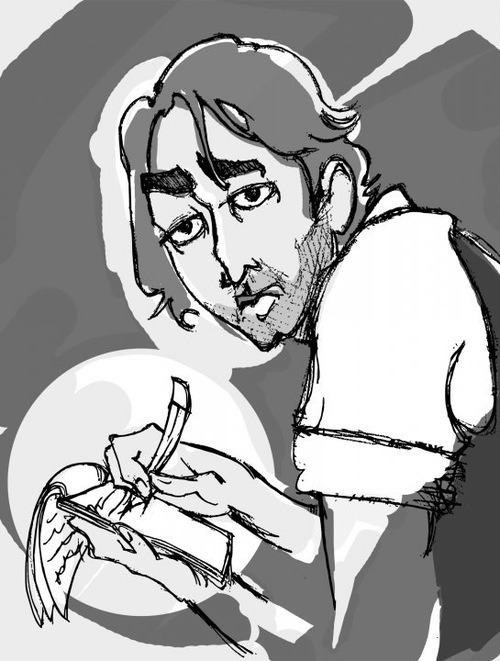Meet a NYFA Artist: Robert Attenweiler
Robert Attenweiler, as drawn by Miriam Gibson
NYFA speaks with 2011 Playwriting/Screenwriting Fellow Robert Attenweiler
NYFA: Hello Robert, thanks for speaking with us, can you tell us a bit about what you’ve been working on and what’s coming up for you?
RA: Hi. Thanks for having me. I just finished up a one-hour TV pilot script about professional basketball in New York in the 1970s. It’s based on the old American Basketball Association at the dawn of big money professional sports where there was still a Wild West aspect to sports and the business of sports. I’ve also had the opportunity to tour a little bit with my play, Our Greatest Year, that we debuted in NYC last summer. It deals with an obsessive Cleveland sports fan, so we’d been pushing to get it out to Ohio. We got some bites on that and it’s been a great blast.
Then I’m working on a couple new plays that, yes, are non-sports related. I’ve been developing a commissioned work with Blue Coyote Theater Group called I Heart Rock N Roll that’s kind of a riff on classical mythology and the Bret Michaels reality TV series, Rock of Love. Then I have a political thriller-ish play about a deposed American President living in exile. I’m hoping that both of those get to see a little light in the near future.
NYFA: Your writing efforts operate across disciplines, including theater stages and online as graphic novels and web TV episodes. Do you approach writing differently depending on its expected outlet? Do different forms better tell particular types of stories?
RA: Of course – and not always. There are ways in which, as a writer, I’ve had to learn the different nuances of the forms. You figure them out as you go – or there are plenty of people to tell you what they are. But there’s also a way in which working in the different media … different genres, whatever … shows you how innate our understanding of storytelling is – or how well we understand how a TV show works as opposed to a comic book as opposed to a play as opposed to a movie. There are a lot of ways in which the form tells you what a story using it is going to look like and sound like. Beyond that it’s craft and has it’s rules and whatnot. For me, though, it’s more about being true to your medium with how you craft the story. After that it’s all story and storytelling and some ideas will always turn out better than some other ideas.
NYFA: Can you recommend a good play, comic, or something else that has been influencing you lately?
RA: I’m not breaking any new ground by recommending this, but I’m completely on board with The Walking Dead, both the comic and the TV series. Now, this is coming from someone who is admittedly terrified of zombies. That’s not usually my bag. What I think is fascinating about both works, though, is that it takes a genre that we are used to seeing completely wrapped up in a 90-minute or so package. By serializing that – by committing to forcing the situation to go on and on – it’s finding new storytelling ground, as well. It must be maddening and fascinating to have to write that and constantly find ways to keep this story going when everything in your conditioning is screaming “Resolution, please!”
NYFA: Can you speak to your experiences with self-producing? How and why did you begin working as a producer?
RA: I started producing, frankly, because no one else was lining up to do it. Or they weren’t lining up yet. I got a script into FringeNYC and formed my company, Disgraced Productions, and then realized I might as well keep doing it. As a writer, I’m the one who dictates whether or not I have scripts done and plays ready to be read and all that. So, why shouldn’t I also be able to dictate whether these plays get seen? Are aspects of self-producing just as much of a downer as not being produced? Sure. I would be substantially less broke if I hadn’t been spending the last 6 years putting my money where my mouth is. But, why do this stuff – why be an artist in New York City – if you’re going to sit on the same piece of work for years and years waiting for someone to take the chance on it? I believed enough in what I was doing to take that chance myself – though, clearly, anyone wanting to take the burden of chance off my hands is more than welcome to get in touch with me. Let’s talk.
NYFA: How do you perceive the role of technology in your practice?
RA: I don’t consider myself super ahead-of-the-curve when it comes to technology. But I am a person who tries very hard to come up with solutions or alternatives to some of the challenges facing independent producing artists – and technology tends to rise to the top when I think about that. Clearly, on a distribution level, we’re living in a very democratic time. There are a multitude of places where we can push our latest project off and let it float down the river for awhile. That doesn’t mean anyone will pay attention to it, but having a way to get material to an audience is a real plus. Last year, I talked to a group of NYU seniors about my web series, Apt1B, and my message to them was that they all already had the technology or access to the technology to do their own version of what I was doing. They could start the next day. They could shoot it themselves on their phones and edit it on their computers and, by in large, the world is kind to low-fi online videos. Besides, one the fun things about most technology is that it comes with instructions. So, sure there might be someone who is more of an expert than you on directing or shooting or editing or illustration or whatever, but use the toys, play around, learn a new skill, make something.
NYFA: How did the NYFA Fellowship effect you? What did it go towards?
RA: The NYFA Fellowship was such a blessing. I’d come to a place right around the time of the award where I was really struggling to get my work out there. The income from my night job –which, for better or worse, I’d been using as my main stream of self-financing – was in a bit of a lull and I was looking at not being able to produce my plays or even get enough together to fund a shoot for a few more web series episodes. So, when I received the Fellowship, I knew I wanted to use it to set some projects in motion and be sure I could viably see them through. I had always wanted to do an artist residency – and the Fellowship allowed me to be able to take a month off work and attend the <ahref=“http://www.woodstockguild.org/”>Byrdcliffe Arts Colony for all of last July. I also used it on Canon and accompanying gadgets so that I could have a short film or web series shoot much more in my control … much more at my fingertips when I wanted. And, on a very practical level, it helped me make rent a couple of months so that I didn’t have to sacrifice my writing schedule. Receiving the NYFA Fellowship was the most supported I’ve felt as a working artist in New York City and I could not be more thankful.
NYFA: Thank you for taking the time to speak with us Robert!
For more information on Robert Attenweiler, visit his website .





